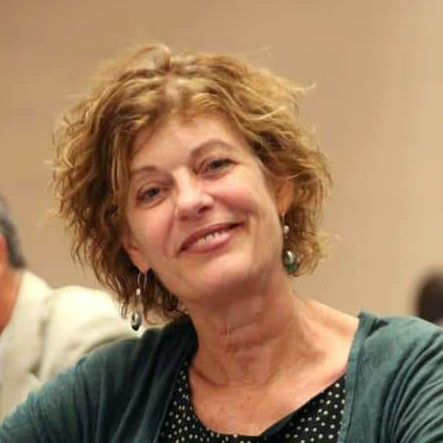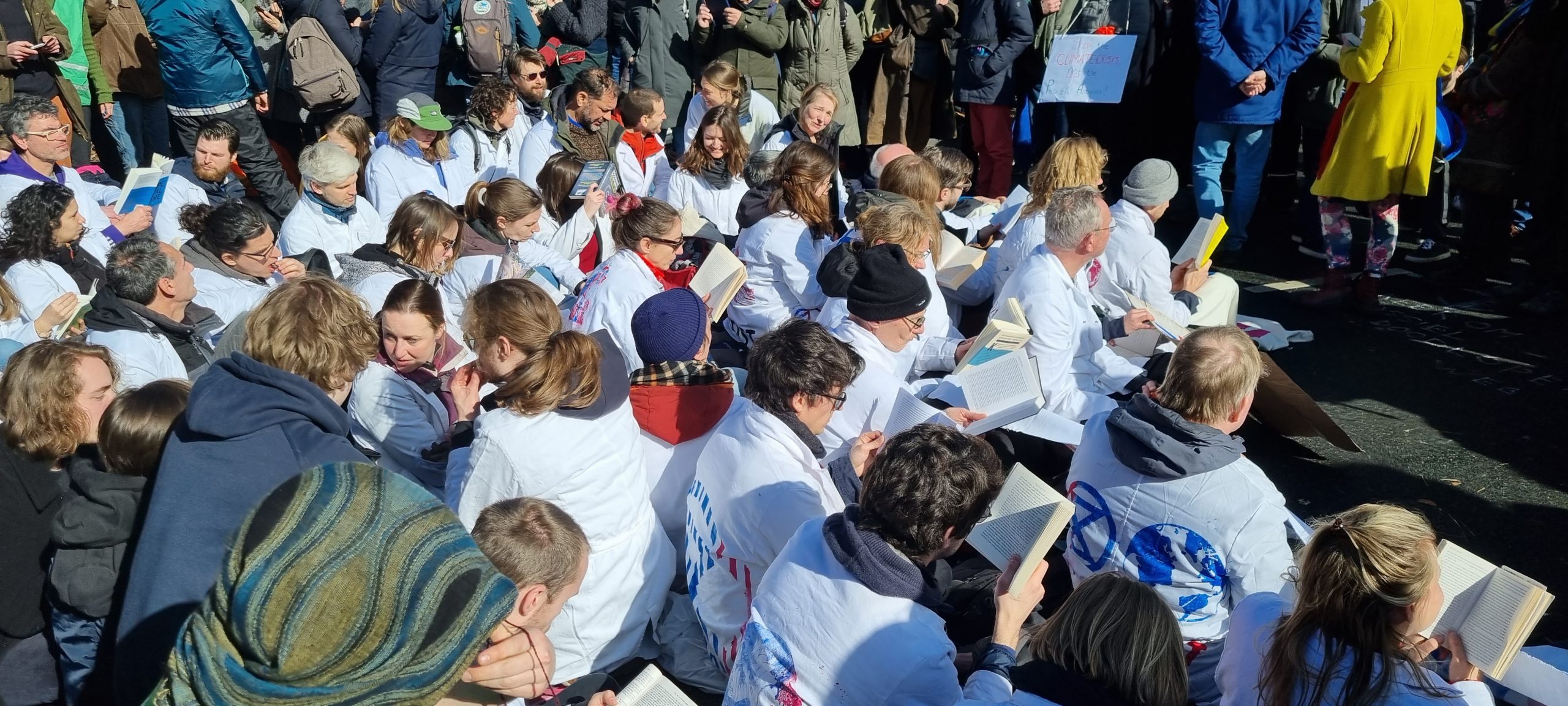On Saturday March 11, I walked from the Hague Central Station along the evacuated government buildings, to the highway A12, where the Extinction Rebellion (XR) rebels were supposed to sit down and block the road. Instead of rebels, I saw a battalion of policemen occupying the road, to prevent the rebels from doing so. An older man who was standing next to me, staring into the empty ramp remarked: “they have occupied the road and hence help the protesters.” Irony. The police force’s appearance was scary and intimidating, though they say protecting. Later, when I was getting ready to leave, I heard the policeman who was standing in front of the water cannon lent from Germany, tagged with protesters’ stickers, saying that he agreed that something has to be done: “it is important that they ask attention for these problems.” And to my question “what are you going to do?”, he replied: “I am waiting for orders.” The orders came; they used the water cannons and arrested 700 XR rebels. This day was my first experience of XR.
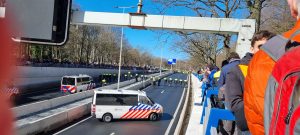
Police occupies the A12 highway. © Mirjam de Bruijn
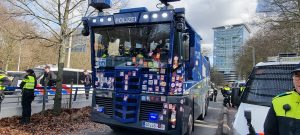
Water cannon tagged with stickers from protestors. © Mirjam de Bruijn
Extinction Rebellion (XR), an international movement asks immediate climate action, is growing in the Netherlands. People join for various reasons, but the essence for all is the sense of urgency that something must be done. But what can we do? This increasing feeling of hopelessness is one of the motivations people shared with me when walking around the site where the XR rebels joined forces to occupy highway A12 to force the government to stop subsiding the fossil industry: billions of Euros of the taxes the people in the Netherlands pay are used for tax reduction for the fossil industry. The protest stands also for other injustices that our government and governments of the world perpetuate with their bad policies.
In the meantime, the rebels are chilling with their supporters at the A12, side Malieveld. It is a sunny day which gives the protest a festive vibe. The supporters and rebels mingle on the asphalt and listen to speeches about climate change, how it among other things affects indigenous people in Latin America. They are together when chanting “What do we want? CLIMATE JUSTICE. When do we want it? NOW!” This peaceful theater hides differences. The older generation is accused of not having been alert enough to stop the climate change. They embrace the critique and are hoping to be able to do something. Parents, grandparents, grandchildren, children unite in oppositions this afternoon on the A12.
Towards 4pm people climb trees in the central reservation of the a12 to uphold the blockade as s long as possible. The rebels start to be a bit restless: it is unclear what will happen, and it is so different from last time, six weeks ago, when they managed to occupy the A12. There are about 3000 rebels to blockade the A12. Supporters, maybe also 3000, leave the road when the police start their warnings. The police warns that at 5 o’clock they will start arresting people who stay on the A12. About 1000 rebels stay sit on the road and hook into each other. They will not leave. The police positions the water cannons, there are three now, and start spraying water on the rebels, using the waterjet. When this all does not help, there are still 700 people sitting on the road, the police starts to carry the drowned rebels from the pavement to city buses and transport them to the police office, where they are interrogated. During the XR training they were thought not to say a word. When you answer they could use it against you to prove you did something wrong. However, there is nothing wrong with participating in a demonstration that is peaceful. The rebels who identified themselves were all freed after a few hours. The ones who went anonymous for various reasons were held much longer, some even overnight. The police have had a hard crack to remove 700 rebels, also from the trees and the lantern posts. Some policemen could not keep their temper.
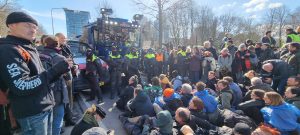
Protestors sitting in front of one of the water cannons. © Mirjam de Bruijn
XR attracts a lot of attention: Dutch Radio and TV report live on the event. The national newspapers published long essays about XR already on the same day. In all of these publications XR’s message is repeated: XR is against violence, its actions are peaceful, and they aim for change.
But what is violence, and who was violent on this Saturday? Violence is not only the direct violence, that causes physical injuries. It is also the threat of violence. I noticed feelings of anger and frustration in my body when confronted with the police force, of which some wore black masks covering their nose and mouth, making this human confrontation feel like it was us against them. Experiencing these emotions myself I could only imagine those felt by the XR rebels. But then behind the black masks were human beings with their own ideas too, who might also have felt threatened. These feelings of not being seen, heard and demonstrating in front of anonymous black masks, leads to radicalization as a reaction to the feeling of hopelessness, the anger towards those who do not listen to messages that are so important, and towards the actions of those who do not listen. The Dutch police force is often hailed for its human approach. The policewoman in charge who ordered her colleagues when they took a rebel only by his arms, his feet scraping over the ground: “you have to do this with four men”, shows a certain discipline of this approach. Nevertheless, the exposure of the Power of the State during this XR occupation of the A12 will leave in many the feeling of being in ‘war’ and pushes people into a more polarized position. It is time that the leaders of the Dutch government start to negotiate and reply to the XR questions with real action that can save the future of our planet for the next generation.
